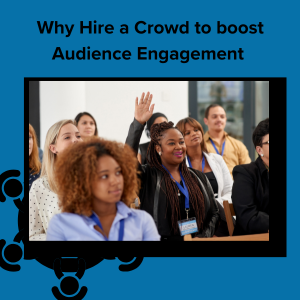The Psychology Behind Rented Crowds and Why They Work
In the world of marketing, events, and public relations, appearances matter. The concept of renting a crowd—hiring people to attend an event to create an impression of popularity and engagement—leverages key psychological principles that can significantly enhance the perceived success of an event. While the ethical implications are important to consider, it’s fascinating to explore why rented crowds work from a psychological perspective. This blog delves into the psychological mechanisms that make rented crowds an effective strategy.
The Power of Numbers
One of the most potent psychological phenomena behind the success of rented crowds is social proof:
Behavioural Influence: People tend to look to others to determine how to behave in a given situation. A large crowd signals to onlookers that something significant is happening, prompting them to join in.
Perceived Popularity: When people see a crowd, they assume the event or product must be worthwhile, leading to increased interest and participation.
Everyone Wants to Be Part of the Crowd
The bandwagon effect is a psychological phenomenon where people do something primarily because others are doing it:
FOMO (Fear of Missing Out): Seeing a large crowd can trigger FOMO, encouraging more people to attend an event or support a cause to avoid being left out.
Mass Appeal: The presence of a crowd suggests that an event has mass appeal, which can attract a broader audience who want to be part of the popular choice.
Enhancing Perceived Value
Crowds can elevate the perceived value of an event or product:
Scarcity and Exclusivity: A crowded event implies that it is a rare opportunity or exclusive gathering, making it more attractive.
Validation: A large number of attendees can serve as validation for the quality or importance of the event, product, or message.
Creating a Buss and Momentum
Rented crowds can help create buss and momentum, essential for event success:
Initial Spark: A hired crowd can serve as the initial spark needed to generate excitement and draw in genuine attendees.
Media Coverage: Media outlets are more likely to cover events with large crowds, amplifying the event’s reach and impact.
Spreading Excitement and Energy with Rent a Crowd
Emotional contagion refers to the phenomenon where people’s emotions and behaviours are influenced by those around them:
Positive Atmosphere: A large, enthusiastic crowd can create a positive atmosphere that is contagious, enhancing the overall experience for all attendees.
Shared Experience: Being part of a crowd can enhance feelings of unity and shared purpose, making the event more memorable and enjoyable.
Credibility and Trust
Crowds and Brand Ambassadors can lend credibility and trust to an event or brand:
Established Presence: A well-attended event signals that the organiser has credibility and is capable of attracting a large audience.
Trust Building: People are more likely to trust a brand or event that appears to be popular and well-received by others.
Enhancing Visual Impact
The visual impact of a crowd can be powerful in marketing and media:
Photogenic Scenes: Pictures and videos of large crowds can be used in marketing materials to showcase the success and popularity of an event.
Viral Potential: Visuals of a crowded event have higher potential to go viral on social media, further boosting the event’s visibility.
Harnessing the Psychological Power of Rented Crowds for Event Success
The psychology behind rented crowds reveals why this strategy can be so effective. By leveraging principles such as social proof, the bandwagon effect, and emotional contagion, rented crowds and brand ambassadors can significantly enhance the perceived success and attractiveness of an event. While it’s important to balance these benefits with ethical considerations, understanding the psychological mechanisms at play can help event organisers create more engaging, impactful, and memorable experiences. The power of a crowd lies not just in the numbers, but in the psychological signals it sends, making it a valuable tool in the event planner’s toolkit.



